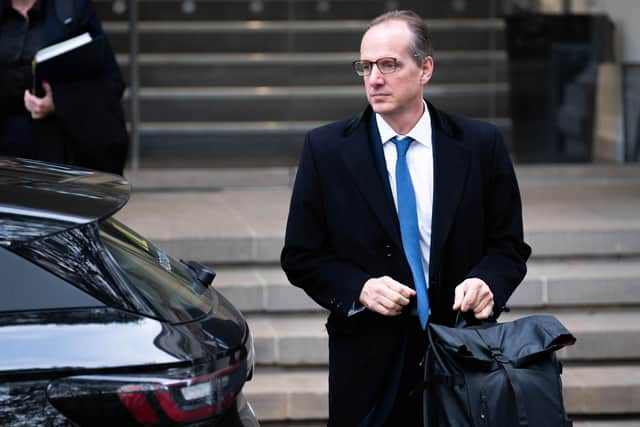The Covid Inquiry is laying bare the true legacy of the Boris Johnson government - Jayne Dowle
Working as a staffer for a big media organisation, this was back when emails and text messages were still in their infancy, and the internet was only available on ‘dial-up’. Even talking out of turn on the telephone, which could be recorded easily, as we journalists knew only too well, was frowned upon.
Older hands warned the younger ones; if you’ve got anything to say that could possibly get you sacked, or cause serious trouble, always say it face to face, in a private place. If it’s not on record, it can’t trip you up, in other words. And, obviously, the unspoken rule; you could always deny it afterwards.
Advertisement
Hide AdAdvertisement
Hide AdAnd so we come to this week’s explosive events in the Covid-19 inquiry. As each gory chapter unfolds, I’m left with a major disturbing thought; why did such senior people, holding such positions of authority at the heart of the British government, carry on like teenage girls gossiping about who’s in and out of the friendship group this week?


Some of the things we’re hearing beggar belief. Whilst millions of British people suffered, not just from symptoms of the pandemic, but from loss of their freedom. And in too many cases, they also lost livelihoods or relatives, were prevented from seeing their families or stranded by travel restrictions, but the people in charge – those at the top – simply carried on regardless.
Sniping, insulting and mocking; how sad is it that the ‘emoji’ allocated to then Prime Minister Boris Johnson was a shopping trolley? We learn that to Dominic Cummings, Mr Johnson’s chief of staff at the time, and Lee Cain, then No 10’s director of communications, Mr Johnson was the human equivalent of an out-of-control shopping basket with a wonky wheel.
We hear that Martin Reynolds, principal private secretary to Boris Johnson, switched on WhatsApp’s ‘disappearing message’ function on a group chat titled "PM Updates" on April 15, 2021, shortly before the public inquiry into Covid was announced.
Advertisement
Hide AdAdvertisement
Hide AdReynolds, known for sending colleagues a ‘BYOB’ invite during lockdown on May 20, 2020, when he invited those working at 10 Downing Street to “make the most of the lovely weather and have some socially distanced drinks” in the garden, said he couldn’t quite exactly recall why he had done this, insisting it wasn’t an attempt to hide information from the inquiry. Do you believe him? I don’t. However many messages have conveniently ‘disappeared,’ the clear fact is that the extent at which decision-making during the UK’s biggest pandemic in living memory relied upon WhatsApp is terrifying.
Not just because hiding behind a digital profile allowed the key players full rein to vent their splenetic vitriol, but also because it seriously calls into question the nature of democracy.
Major decisions were made without going through established constitutional processes, not even by gathering the Cabinet around the Downing Street table, never mind taking matters to a virtually-sitting House of Commons.
All this was done in the name of ‘national emergency’ and the public – and other politicians – had to accept that it was happening for the right reasons, and that we had to trust the inner core of government to do the right thing.
Advertisement
Hide AdAdvertisement
Hide AdAs we know now, most of the time, they did anything but. Too preoccupied with infighting and nastiness, too many egos flying, and scant regard for the public, the whole thing smacks of privilege and lack of political leadership.
We have already heard Simon Case, the cabinet secretary, saying that Boris Johnson could not lead, and made good government “impossible” by changing direction “every day”. Sir Patrick Vallance, the former chief scientific adviser, has raged at Johnson’s “ridiculous flip-flopping”, who judged at the end of February 2020 that the biggest risk was “overreaction” to Covid.
Where are we, the public, left as we hear the tale of this sorry shambles unfold? And equally as important, where does this leave the current government, headed by Rishi Sunak, who was Chancellor of the Exchequer in those dark days?
What happens if this winter, another pandemic drops among us?
Advertisement
Hide AdAdvertisement
Hide AdWhat if it’s more virulent than the last, and bearing in mind that the NHS is already on its knees in recovery from Covid-19, how would the country really cope? We certainly, I’m sure, would never trust our government again to do the right thing. And that is the true legacy the Johnson government will leave us.
